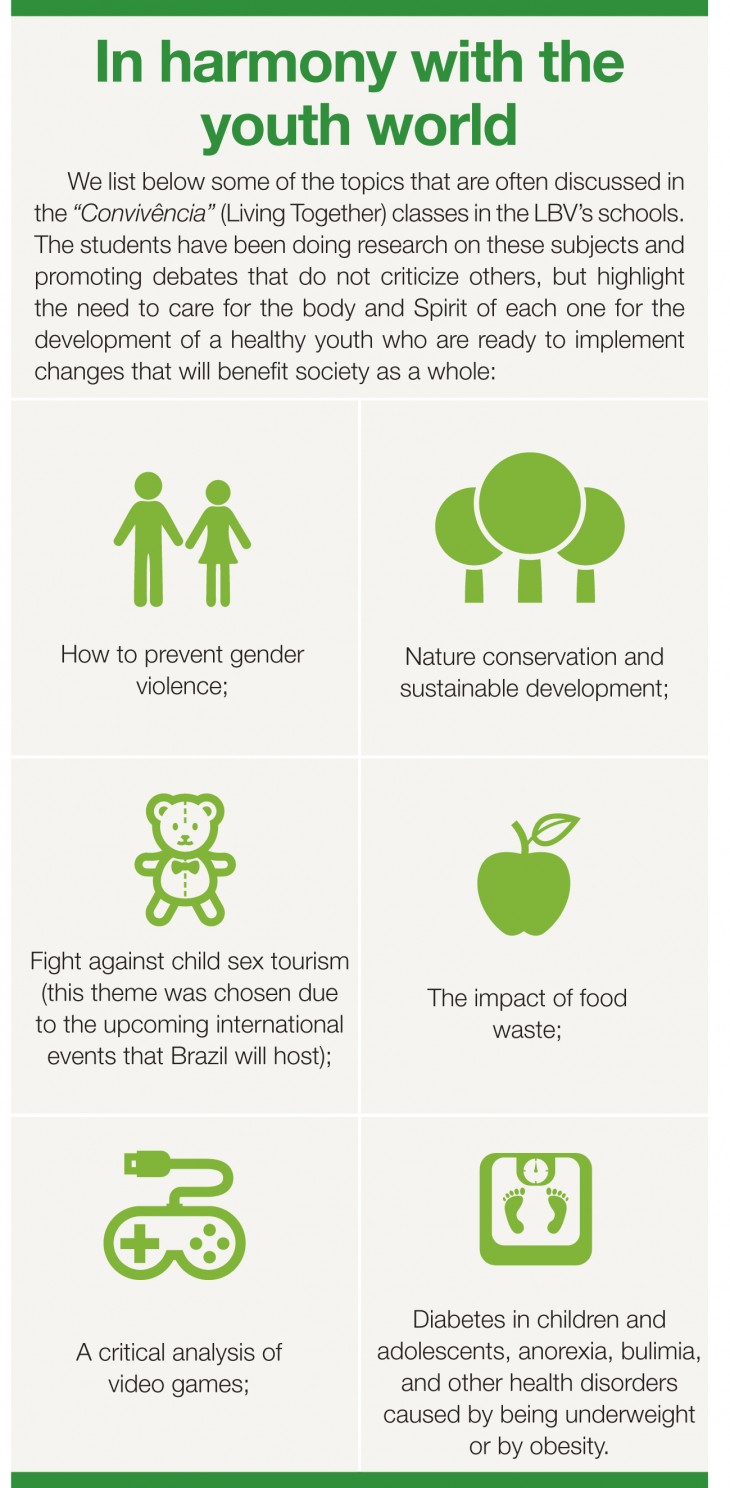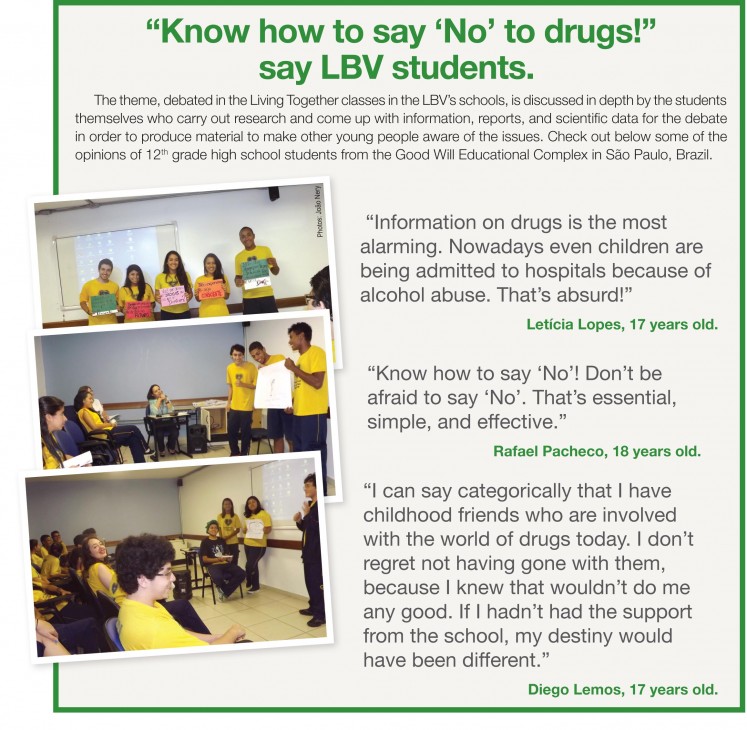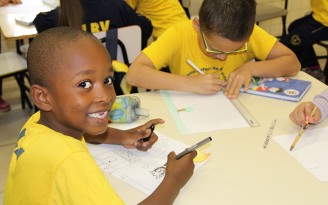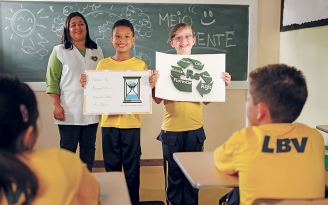
Educating planetary citizens
LBV’s methodology encourages students to build a better society
Suelí Periotto
Tuesday | July 15, 2014 | 9:16 AM | Last update: September 22, 2016, 4:07 PM (Brasilia time)

The teaching method of the Legion of Good Will (LBV), devised by educator José de Paiva Netto, President of the Organization, is comprised of the Pedagogy of Affection (directed at children up to the age of 10) and the Ecumenical Citizen Pedagogy (starting at the age of 11). Its concept points to an education in which all the subjects on the school curriculum are infused with ethical, ecumenical, and spiritual values.
To apply this unique approach, as proposed decades ago by the creator of this pedagogical line, educators of the LBV’s teaching network developed the MAPREI (Learning Method through Rational-Emotional-Intuitive Research), a methodology that proposes six action stages in the entire syllabus of basic education. The purpose of this facilitating educational tool is to guarantee greater involvement of children and young people during classes, making them coparticipants in their own learning process. This is achieved by way of the attentive mediation of educators and other professionals, whether during formal education or recreational-pedagogical activities.
Students are not mere listeners in the MAPREI. During their academic journey, children and young people are motivated to research, discuss, and carry out effective actions that can bring about positive changes in society.
Because our students live in situation of social vulnerability, they are encouraged to participate in projects that help improve the structure of the places and surroundings where they live. Thus, solutions for the challenging issues of their community come up, which also benefit their families. This becomes even more evident in the final years of basic education when these young people are preparing for an important step in their academic lives: entering higher education. It is at this moment that we notice the result of the education they received at the LBV from a very early age, which is based on values of an all-encompassing Ecumenical Spirituality for their full development. The participative knowledge they acquired during these years prepares them, for example, for facing up to questions relating to drug use.
According to the United Nations (UN), illegal drugs kill more than 500 people per day in the world (men, women, and children). These numbers are found in the World Drug Report 2013 of the UN Office on Drugs and Crime (UNODC), and show the seriousness of the problem.

Knowledge and critical thinking
In this particular issue, our experience has shown that outside influence alone, like talks and lectures, is not enough to raise a strong awareness and form the critical thinking of young people. They need to create their own personal defense mechanism. In this article we will show how—by applying the MAPREI—we prepare the students to face common issues of adolescence, as for example, knowing how to say no to drugs when they are offered by so-called friends who might want to influence them to try drugs.
To illustrate this, we chose to explore the “Convivência” (Living Together) classes. This school subject, created by the founder of the Good Will Educational Complex, has the purpose of discussing issues linked to sexuality—combining feelings and responsibility—and other current affairs.
MAPREI step by step
The lesson plan we will share with you was used with 12th grade students in this year's trimester.
1st stage: mobilization and identification of the content/theme — we told students the story of an inventor who wanted and managed to make it rain. During the debate we asked: “Where do you want to make it rain in your life?” Each one wrote down their objectives for the next few years;
2nd stage: individual search for knowledge — a research was undertaken on the topic “Drugs and their consequences: sexual dysfunction and sterility”. The students used magazines, newspapers, websites, and medical documentaries. They made a list of main topics they wanted to discuss in the classroom;
3rd stage: socialization of knowledge — students shared with their classmates what they had discovered in their research;
4th stage: conclusion — they were asked to make a group presentation for their younger colleagues and provide an overview of the information they had gathered. They explained the effects of both legal (alcoholic beverages and tobacco) and illegal (various drugs) substances on the male and female organisms, to the point of causing sterility and sexual dysfunction, which thus prevent them from establishing a family in order to continue with their lineage;
5th stage: presentation of results — the moment when the older students (around 17 years old) shared their research with the younger ones (between 11 and 13 years old) was remarkable. At this stage the results of the MAPREI are more visible, because it is possible to assess what they have learned from the researches and discussions on the theme mediated by the educator. The 12th grade students’ project was significant; so much so that they were invited to participate in a special edition of the program O Assunto é Jesus! [The Subject is Jesus!], on Boa Vontade TV (Channel 20 on SKY cable TV). There, the students talked about all the steps of their project (which made them very happy because they were able to learn more during their experience with the younger students), and reported the results of their research and their individual conclusions. Also in this stage of the MAPREI, the students presented during the parent teacher conference posters, cartoons, and other artistic activities they had prepared on the topic. The families were pleased to see how the students developed the topic and how much knowledge they acquired on the subject, which guarantees that their children be kept far from these substances that have caused so much damage to children and young people;
6th stage: individual conclusion — by the end of the term, the young people were assessed and debated the topic, reaching their own conclusions of how the proposal of this research about drugs had contributed to their own lives.

Involvement and dialogue for real learning
All the stages mentioned were devised to make the MAPREI not just a tool for transferring information, but also to enable students to express themselves with regard to topics and to engage them in the teaching processes.
The applicability of this innovative educational concept is marked by the unique approach that allies “Brain and Heart”, according to the proposal created by Paiva Netto, for it is necessary to invest in the development of the intellect without forgetting that we are all beings with a mind and soul that need spiritual comfort; in the words of the LBV’s president, we need to have “a view beyond the intellect.”
Teachers from the Legion of Good Will’s schools conduct with the students research and hold discussions on topics that are part of an all-encompassing Ecumenical Spirituality curriculum that permeates the Organization’s teaching proposal integrating development (feelings) with the necessary information (intellect). The aim is to develop the students’ biopsychosocial spirit. The most important thing is that these actions have a great impact and they can be replicated, which makes the learning process even more enriching and participative, yielding good results for society.
____________________
*Suelí Periotto is the Supervisor of the Good Will Pedagogy (comprised of the Pedagogy of Affection and the Ecumenical Citizen Pedagogy), and Principal of the José de Paiva Netto Educational Institute in São Paulo (Brazil). Ms. Periotto holds a Master’s degree in Education from PUC-SP and is currently pursuing a Doctorate degree also in Education from the same university. She is a conference speaker and the host of the Educação em Debate [Education on Focus] program of the Super Good Will Radio Network.


